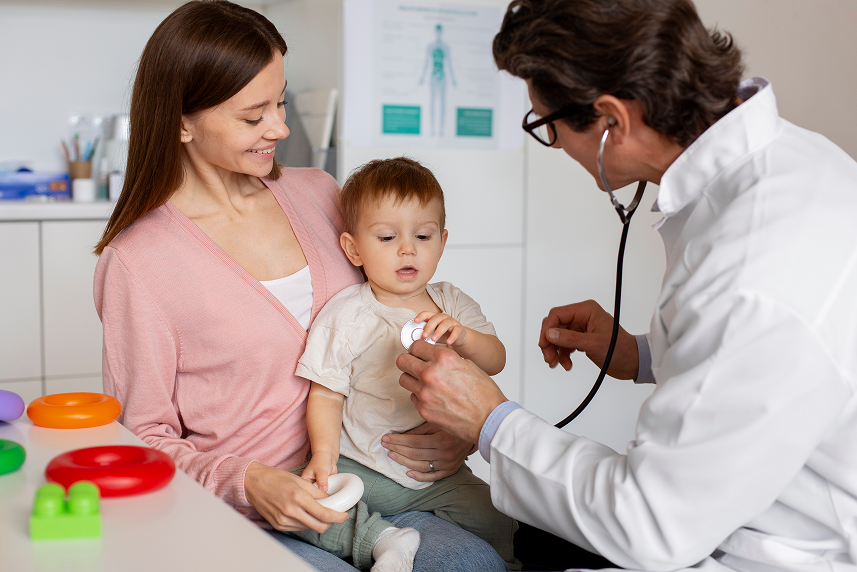Becoming a parent is a joyful experience, but it can also feel overwhelming—especially during your baby’s early days. One important step in your baby’s care is the first doctor visit, usually scheduled within the first week after birth. Many new parents feel nervous, unsure of what will happen at this visit. However, knowing what to expect can help you feel calm and prepared.
In this blog, we’ll walk you through what happens at your baby’s first check-up, what questions you can ask, and how to make the most of the visit.
Why Is the First Visit Important?
To begin with, your baby’s first visit to the pediatrician is very important for their health. During this visit, the doctor will check your baby’s weight, growth, and development. It’s also a chance to spot any early signs of health issues and to give you advice on feeding, sleep, and baby care.
Most importantly, it helps build trust between you and your child’s doctor. When you feel comfortable asking questions, you can give better care at home.
When Should You Take Your Baby?
Usually, the first visit happens between 3 to 5 days after birth. If your baby was born early or had any problems at birth, the doctor may ask to see your baby sooner.
It’s always best to schedule the appointment before you leave the hospital. That way, you already have a plan in place, and you won’t miss this key check-up.
What Should You Bring?
Before heading to the clinic, it’s good to prepare. Here’s a simple list of things you should take with you:
- Baby’s hospital records (you may get a discharge summary)
- Health or immunization card (if given)
- Diapers, wipes, and an extra outfit
- A blanket or swaddle
- Feeding items (bottle, formula, or breast pump if needed)
- Your list of questions or concerns
Bringing these items will make the visit smoother for both you and your baby.
What Happens During the Check-up?
Once you arrive at the clinic, the nurse or doctor will begin by checking your baby’s weight, height, and head size. These measurements show how well your baby is growing.
After that, the doctor will do a physical exam. They will:
- Look at the baby’s eyes, skin, and mouth
- Listen to the heart and lungs
- Check the belly, arms, legs, and hips
- Look at the baby’s reflexes and movements
The doctor may also check your baby’s umbilical cord area to make sure it’s healing properly. If you had a boy and he was circumcised, the doctor will check that area too.
Common Questions the Doctor May Ask
To understand how your baby is doing, the doctor may ask you several questions, such as:
- How often is your baby feeding?
- Are they having wet diapers and bowel movements?
- Is your baby sleeping well?
- Do you notice any strange behavior or sounds?
Answering honestly will help the doctor give you the best advice. There are no “wrong” answers—just tell them what you’ve noticed so far.
What You Should Ask the Doctor
Just as the doctor asks you questions, you should feel free to ask yours too. For example:
- Is my baby gaining enough weight?
- How do I know if my baby is getting enough milk?
- How should I care for the umbilical cord?
- What sleep position is safest?
- When should I worry about crying or spitting up?
These questions are common for new parents, and your doctor is happy to answer them. Don’t be shy—this is your time to learn.
Will My Baby Get Any Shots?
During the first visit, your baby may not receive any vaccines unless it wasn’t given at birth. However, the doctor will talk to you about the vaccination schedule and explain what vaccines your baby will need in the coming months.
It’s important to keep track of all vaccines, as they protect your child from dangerous diseases.
Tips to Make the Visit Easier
First, try to feed your baby shortly before the appointment to keep them calm. Second, dress them in clothes that are easy to remove, since the doctor will need to undress them for the check-up. Third, arrive a little early to fill out any forms or speak with the receptionist.
Finally, bring support if you need it—like your partner, parent, or friend. It’s okay to ask for help when you’re tired or feeling unsure.
After the Visit
After the check-up, the doctor will let you know when to come back—usually around your baby’s 1-month birthday. They’ll also remind you about feeding, sleep routines, and hygiene. If you forget to ask something, you can always call the clinic later.
Remember, the first visit is just the beginning of your journey with your pediatrician. Over time, you’ll get more confident and learn what works best for your baby.
Final Thoughts
In short, your baby’s first doctor visit is a big step in caring for their health. Although it may feel stressful at first, knowing what to expect can ease your mind. From growth checks to helpful advice, this visit sets the foundation for your child’s medical care.
Above all, trust yourself and ask questions. You’re doing your best, and that’s what matters most. The more you learn now, the better you’ll feel as a parent in the days ahead.

